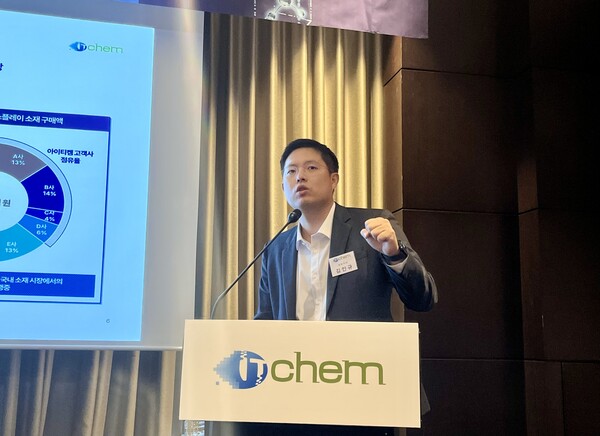IT Chem wants to be the Korean version of Merck KGaA, or perhaps DuPont. Either way, the specialty materials maker is preparing for an initial public offering with ambitions that stretch far beyond its roots in OLED display chemicals.
At a press briefing in Seoul on Tuesday, CEO Kim In-kyu said the country is overdue for a globally competitive supplier that can serve both pharma and electronics at scale.
“There’s no reason Korea can’t produce a company like Merck or DuPont,” he said, pointing to the mismatch between industrial demand and the supplier base.
“Samsung, LG, and SK each spend tens of billions of dollars every year on materials. But we still don’t have a single domestic firm that meets the technical depth, scale, and independence global clients expect.”

IT Chem, founded on two decades of synthetic chemistry know-how, has built more than 500 proprietary process recipes and now operates as an integrated contract development and manufacturing organization (CDMO) across pharma, displays, and batteries.
Its current business spans drug intermediates, high-purity display materials and nucleic acid synthesis, a combination that Kim says gives the company a rare edge in Korea.
“Are there really any Korean companies doing both pharma and electronic materials?” he asked. “Not really.” But look globally, he added, and the model is not unusual.
Merck KGaA operates across life sciences, pharmaceuticals and advanced display materials. DuPont, once a sprawling conglomerate, manufactures everything from pharma-grade reagents to semiconductor etching chemicals.
Now entering the final phase of its corporate split, DuPont is spinning off its electronics operations and narrowing its focus on healthcare and specialty materials. To Kim, the move shows that diversification -- bundled or not -- is now standard.
“The core technologies are the same,” Kim said. “The production methods, the equipment, the foundations are very similar. The synergy is in the manufacturing and capability. In Korea, companies build portfolios around clients. We’re doing it around capability.”
The pitch to investors rests on three pillars. First, existing global partnerships, which Kim did not name, rely on custom synthesis of small-molecule intermediates and reagents used in everything from OLEDs and lithium-ion batteries to targeted therapeutics.
Second, the company casts itself as a pure-play CDMO, free from the IP conflicts that come with in-house competition. And third, it is investing early and aggressively in capacity.
According to the company's investor filings, the pharma segment now accounts for 60 percent of IT Chem’s revenue, fueled in part by demand for synthetic biology platforms used in mRNA, GLP-1 drugs, and gene editing. “We are positioning ourselves as a CDMO focused on synthetic biology,” Kim said, listing oligonucleotides, peptides, and raw materials for GLP-1 receptor drugs as key areas.
While IT Chem remains a second-tier vendor to display giants like LG Display and Samsung Display, Kim noted that the company supplies all four major panel makers. That, he said, gives it a broader footprint than some of its peers. First-tier suppliers are typically firms like Byucksan, Rayodos, Merck and DuPont.
One benchmark the company has already hit is long-sequence synthesis. IT Chem has succeeded in producing high-purity, low-impurity oligonucleotides over 20 bases in length, a technical milestone that many global CDMOs still struggle to reach.
“Every additional base reduces yield by nearly 90 percent,” he said. “So you need a highly optimized process. Our yields in Europe are already approaching top-tier levels.”
The company is expanding its manufacturing base in Goesan-gun, North Chungcheong Province, with a new drug substance facility set to come online next year. A separate plant dedicated to OLED materials is also undergoing expansion.
Both, Kim said, are being built ahead of confirmed orders. “We are deliberately pre-building capacity,” he said.
Much of the company’s recent growth stems from its work in oligonucleotide APIs, where it has transferred and scaled client processes using lessons learned from producing a key diabetes drug intermediate. Kim said those capabilities now extend to obesity drugs, mRNA vaccines, and immuno-oncology materials.
Quality, too, has been part of the sales pitch. The company reported zero quality deviations in the past three years, which Kim said helped secure positions in the supply chains of “multiple top-tier global pharmas.” He described the company’s model as full-cycle, from R&D and process development through to scale-up and GMP-compliant production.
Meanwhile, IT Chem plans to offer 2 million shares at a price range of 14,500 to 16,100 won, or about $10.45 to $11.60 per share. The company aims to raise between 29 billion and 32.2 billion won, or roughly $21 million to $23 million. Bookbuilding will run through Wednesday, with retail subscriptions scheduled to open next Monday.

